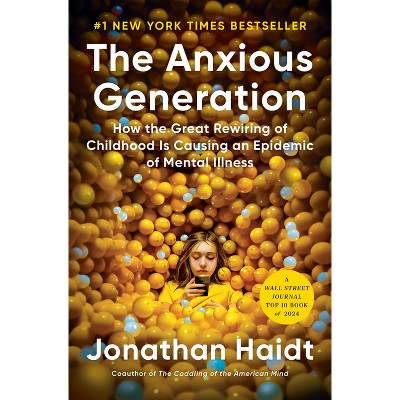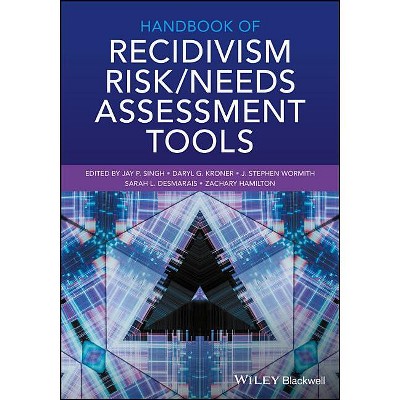Cognitive Self Change - by Jack Bush & Daryl M Harris & Richard J Parker (Hardcover)

About this item
Highlights
- COGNITIVE SELF CHANGE "The consensus amongst the leading researchers in the offender treatment area is that the comprehensive and sophisticated clinical methods the authors have derived for offender treatment are unsurpassed.
- About the Author: Jack Bush has developed and delivered treatment programs for offenders since 1973.
- 208 Pages
- Psychology, Forensic Psychology
Description
About the Book
"This book draws on the latest literature to highlight a fundamental challenge in offender rehabilitation; it questions the ability of contemporary approaches to address this challenge, and proposes an alternative strategy of criminal justice that integrates control, opportunity, and autonomy"--Book Synopsis
COGNITIVE SELF CHANGE"The consensus amongst the leading researchers in the offender treatment area is that the comprehensive and sophisticated clinical methods the authors have derived for offender treatment are unsurpassed. Indeed, they have formed the basis for what is known as the core correctional practices for reducing anti-social behavior."
Paul Gendreau, Professor Emeritus, University of New Brunswick
"Bush and colleagues' phenomenologically based approach to offender rehabilitation is based explicitly on the stories they have collected from prisoners and probationers and is a welcome contribution to an academic literature that too often obfuscates the actual work involved in delivering help to the hardest to reach in the criminal justice system."
Shadd Maruna, Ph.D., Dean of the Rutgers School of Criminal Justice
Cognitive Self Change presents a practical guide to rehabilitation based on understanding the way individual offenders experience themselves and the world around them at the moment they offend. De-incentivizing criminal behavior and replacing it with self-empowered change are the keys to upending the traditionally antagonistic relationship between criminals and those meant to help them change. The authors, with their experience of working with offenders and implementing rehabilitation programs, have drawn together clinical and academic perspectives on the treatment of high-risk offenders, analyzing current approaches to treatment and the problems encountered in their application.
Cognitive Self Change rejects the traditional dichotomy of control versus treatment, devising instead a strategy that integrates both. Focusing on high-risk and "hard-core" offenders, not just those that are "ready to change," they discuss why offenders offend, why they are seldom motivated to change, and why they often fail to engage in treatment. This leads to a strategy of communication that teaches offenders a set of skills they can use to change themselves, and that motivates them to do so.
From the Back Cover
Antisocial and anti-authority attitudes that lead to criminal behavior pose special challenges for treatment. Understanding how offenders think and how they experience the world is the first step to helping them change. De-incentivizing criminal behavior, and helping replace it with self-empowered change, are the keys to upending the traditionally antagonistic relationship between criminals and those meant to help them change.The authors, with their experience of both working with offenders and implementing rehabilitation programs, have drawn together clinical and academic perspectives on the treatment of prolific and persistent offenders, and offenders meeting the diagnostic criteria for Antisocial Personality Disorder, analyzing current approaches to treatment and the problems encountered in their application.
They focus on high-risk and the most "hard-core" offenders, not just those that "are ready to change". They discuss why offenders offend, why they are seldom motivated to change, and why they often fail to engage in treatment, leading to a strategy of communication that teaches offenders a set of skills that they can use to change themselves, and that motivates them to do so.
Cognitive Self Change rejects the traditional dichotomy of control versus treatment, devising instead a strategy that integrates both.
About the Author
Jack Bush has developed and delivered treatment programs for offenders since 1973. His primary focus has been on the processes and strategies of Cognitive Self Change, which he has adapted to high-risk offenders, violent offenders, substance abusers, female offenders, and domestic abusers. He is co-author of the program, Thinking For A Change, published by The National Institute of Corrections (Washington D.C.).
Daryl M. Harris is a Chartered and Registered Clinical Psychologist working with the Gwent Forensic Rehabilitation Service. He is also director of Positive Approaches to Crime and Exclusion (PACE) Ltd. This organisation has supported the implementation of Cognitive Self Change in several jurisdictions, written and supported the implementation of accredited interventions, and undertaken research into instrumental and gang violence. He has also worked with probation staff in Wales to develop an award winning approach to working with difficult to engage offenders.
Richard Parker is the Program Manager for designing and implementing sex offender, violent offender and general offender programs in Juvenile Justice NSW. Prior to this he was the Principal Psychologist, Offender Intervention Programs in ACT Corrective Services. He is currently investigating the role of moral emotions in the onset and maintenance of child sexual offending.











